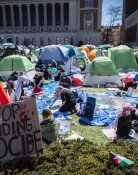S. Korea to use solid fuel for space development
S. Korea to use solid fuel for space development
Posted July. 30, 2020 07:50,
Updated July. 30, 2020 07:50
South Korea can now use solid fuel for space launch vehicles following a revision to missile guidelines signed by Seoul and Washington in 1979. The South Korean presidential office Cheong Wa Dae announced on Tuesday that the updated guidelines allow South Korea to research, produce and possess space launch vehicles that use solid and hybrid propellant as well as liquid fuel.
The fourth amendment is meaningful in that it has removed obstacles to Seoul’s long-range rocket development. Ever since a memorandum of understanding (MOU), which limits the range and the weight of warheads South Korea can develop, was signed in 1979 after South Korea developed a missile, the guidelines have hindered the development of space and defense capabilities of Seoul. Although the restrictions were gradually lifted in response to increasing threats from North Korea, Seoul was still unable to launch a proper satellite while Pyongyang fired intercontinental ballistic missiles (ICBM).
With the recent revision, South Korea will be able to compete with other countries in the field of space development as it allows the use of solid fuel, which is more efficient and affordable than liquid fuel. This holds significance especially from the military perspective. The South Korean military, which has relied on the “eyes” of the United States, can now develop its intelligence, monitoring and surveillance capabilities. It can launch a satellite into orbit from a launcher it developed to build an “around-the-clock monitoring system,” which will be a key part of transferring wartime operational control.
The 800-kilometer range limit will stay although the removal was initially discussed between the two nations. “It will be lifted in the not-so-distant future when the time is right,” said Kim Hyun-jong, the deputy national security advisor. Given that Seoul now has the ability to switch to long range ballistic missiles that are similar to ICBMs, there is no need to rush the removal of the range limit that is bound to cause a backlash from neighboring countries.
The lifting of restrictions is great news, especially considering defense cost sharing negotiations between Seoul and Washington have been in a stalemate and U.S-China tensions are escalating. However, experts are concerned that the United States might request South Korea to make more contribution or to join it in keeping China in check. Rising tensions between the United States and China mean more risks and difficulties for South Korea’s diplomacy. It is going to be tough, but great diplomacy can protect and even promote national interests at times like this. The alliance with Washington has been strengthened, but Seoul will have to manage relations with other nations, too.
klimt@donga.com
Headline News
- N. Korea launches cyberattacks on S. Korea's defense companies
- Major university hospital professors consider a day off each week
- Italy suffers from fiscal deficits from ‘Super Bonus’ scheme
- Inter Milan secures 20th Serie A title, surpassing AC Milan
- Ruling and opposition prioritize spending amid tax revenue shortfalls







